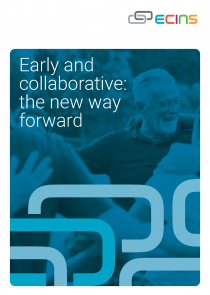Catalyst in Communities is an ethical not for profit social enterprise specialising in working with communities and young people to improve a wide range of areas including Problem Solving and Training, Youth and Community Engagement and Interventions, ASB, Restorative Practice, Domestic Violence, Radicalisation and Extremism work, CSE and Employability.
Founder and Director Robin Lockhart is the current holder of the Commonwealth Youth Worker of the Year Award and receiver of both the European and Global Youth Worker of the Year Awards.
ECINS spoke with Robin about his work and how his approach is making a difference to young people’s lives:
Some 8 years ago Robin set up Catalyst in Communities with Dr Tim Pascoe, a Doctor of Criminology. Robin’s own background is within youth and community development and behavioural change and for many years Catalyst has worked in partnership with the charity Through Unity who support bereaved families when a murder takes place. Robin is now also the CEO of Through Unity.
Through these organisations Robin and his team have worked and continue to work, with some of the traditionally labelled ‘challenging and hard to reach’ people across London, the UK and around the world.
Robin, however, doesn’t believe the labels. His core belief is that people are never only one thing. If somebody is referred to him as a perpetrator of a crime, a bully, a victim or a truant – that is not who they are… “We are not our behaviour…”
His core belief is that if we only look at the labels we are missing the point. People can be a truant, a victim, a bully and a perpetrator all at the same time! By looking at the label people often miss the opportunity to engender the very change that they seek and at the heart of this approach is Robin’s ability to look at the bigger picture and recognise that the people he is working with are not THE problem, they are AROUND the problem or FACING the problem.
Robin said ‘Something I have noticed for many years is the prevalence of the ‘deficit model of engagement’ in the UK – that the only time we engage with young people is when something wrong has been identified – after the harm has been caused. It’s a negative starting point and I try to change that perception straight away”.
“A lot of the time staff that get sent to work with young people don’t seem to be able to get the message through that they care; they are often perceived to only be there because it’s their job – to try to get young people to stop their negative behaviour. For me this is where all good youth work stems from and I have to be able to see and understand behaviours from the young person’s viewpoint or I will never understand the root cause. The initial engagement with them is crucial – if we don’t get that right, the process will never have the desired impact.”
“All our work is carried out through meaningful conversations, games and learning activities and the first question I always ask is ‘why do you think you are here?’ This question is the same whether I am working in a school, with a Youth Offending Team, in prisons or with adults too. A typical response is ‘I’m here because of my disruptive behaviour.’ My approach is to help them understand that they are actually there because someone cares and believes in them and wants them to understand that making a small improvement now can have a massive impact on the rest of their life…Perception is everything and an asset based approach helps participants to alter their self-perception.”
In the course of his work Robin finds that people will often blame their environment for their behaviours and his job is to help people see the truth. “It’s a powerful process and I talk to them about the root causes of emotions. It’s our emotions that drive our behaviour and what I like to do is look at the emotions underneath someone’s behaviour. Behaviour is something we do, it’s not who we are.
“For example, when professionals are called to work with an angry young man who is committing anti-social or violent behaviour, they often look at the outcome of his emotions (the violence) and their response is to tell him to stop. To him, his behaviour is logical and justified and because of that, he is likely to do the same thing again and again. My approach is to attempt to see the world through his eyes and accept his view of the world without condoning it. I tell him I can see the incident from his perspective but I look at the underlying emotions that cause him to react the way he does. I explain that if he feels somebody else has made him angry, he is giving control of his emotions to somebody else, giving away his power. I help him to slow down and look at what really is happening and how no one can actually control our own emotions… Emotions are something that come from us as opposed to something that happen to us”.
Robin believes that it is not necessarily the theory or methodology of his work that get the results, “…it’s often in the spaces where people reflect on their emotions, behaviours and actions that makes the difference”. An example of a recent case was a young man Robin met in a group when he was waiting on a court date and likely to be going to prison for GBH. Robin explains:
“I asked him what happened? He replied that his little brother went to a supermarket and a Security Guard grabbed him. He said ‘Obviously, I did what I had to do’. I questioned him a little more about what he actually did do and he eventually said ‘I knocked him out and kicked his teeth out’. I said ‘Did you ask to see the CCTV to see what your little brother had done?’ The young man was angry and leapt out of his chair, insistent that his brother didn’t do anything wrong. I explained to him that Security staff aren’t trained to grab a child for no reason, I explained the many possibilities and scenarios that might have led to the Security Officer grabbing his brother. He became even more angry, and eventually I asked ‘are you going to knock my teeth out too?’ The young man sat down again and put his face to the floor and went quiet…
“I moved on to hear from the rest of the group and conversations began around how changing perspective is often key to changing behaviour. Later on in the day, I brought up the earlier conversation and asked ‘Would you like to hear what I heard in what you told me about your brother?’ He said he did. I told him ‘I heard that you love your little brother, I heard that family is really important to you, I heard that you have pride in your family. I heard that you are a man of action who is not afraid to stand up for what you feel is right and not afraid to take action that you feel is justified.’ He sat up straight and listened when I told him this; clearly proud. The next day we came back and spoke again. I asked him if he felt that it was appropriate to knock the Security Guard’s teeth out and if I assume that he was 100% correct in this, what should the Security Officer’s big brother do to him – following the same rules? He looked to the floor and was quite for quite some time and then replied ‘will you help me write him a letter, I need to say sorry…I was wrong’. None of this would have been possible if I hadn’t have allowed him the space to state his perspective and understood his point of view.
“With each emotion that comes there is information to learn from it that is often the key to enabling someone to change their own patterns of behaviour.
“Whether in the home, playground, road or estate; if someone feels stress, fear or anxiety or if they feel victimised or intimidated, if they can’t take it out on the individual causing them to feel that way, it will always come out in other ways. I look for what is driving the challenging or violent behaviour. If I am only focussing on the behaviour then I am only talking about the symptom, the outcome and not the root cause. If we can deal with the root then the symptom often disappears.”
Over the years, Robin has been involved in initiatives to stop knife crime including a number of anti-knife projects but, despite this, he feels that this isn’t the best way forward. He feels that the right direction would be to focus on peace projects. He said ‘We know what the vulnerabilities and risk factors are in people’s lives that make them carry out these types of crimes. We can spot them as a community and as professionals and we can help them to repair those vulnerabilities. If we move away from this deficit model to a more positive model, people will rise to the occasion. People are looking for an opportunity to show how great they can be. I think that we get more of what we focus on in life and in our communities we need to start to focus squarely on what we want, not what we don’t want…shifting our lens from the problems to the solutions is the key.”
“I don’t believe I can empower people but I know I can run a process that will leave them empowered – they do the empowering and the self development themselves. We help to support them through coaching and mentoring, building healthy self-esteem, confidence and belief in their own abilities and giving them the tools to overcome personal barriers.”
For more information about Catalyst and Through Unity visit: www.Cicuk.eu or www.Throughunity.com or www.robinlockhart.net


